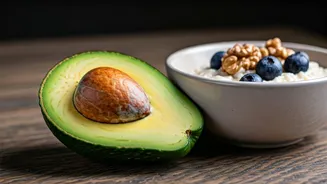Oats: Heart-Healthy Start
Oats are a breakfast staple for a reason: they are loaded with soluble fiber. This type of fiber is particularly effective at lowering LDL cholesterol,
often called "bad" cholesterol. When you consume oats, the soluble fiber binds with cholesterol in your digestive system, preventing its absorption into your bloodstream. This natural process helps reduce the overall cholesterol levels. A daily serving of oatmeal, about a cup, can make a noticeable difference. You can enhance the benefits by adding fruits like berries or a handful of nuts to your oatmeal. Remember, consistency is key; incorporating oats regularly is essential for experiencing these positive effects.
Beans: Fiber-Rich Powerhouse
Beans, like oats, are packed with soluble fiber, making them excellent for lowering cholesterol. They offer a filling and affordable source of nutrients. Various types of beans, including kidney beans, black beans, and lentils, all contribute to this beneficial effect. Regularly consuming beans can help reduce LDL cholesterol levels, supporting overall cardiovascular health. Furthermore, beans are a good source of protein, which can help in weight management, indirectly supporting heart health. Include beans in your diet by adding them to soups, salads, or as a side dish. The fiber in beans also promotes digestive health and can help stabilize blood sugar levels. Aim for at least a half-cup of beans several times a week to reap the advantages.
Avocados: Healthy Fats Boost
Avocados are known for their monounsaturated fats, which are beneficial for heart health. They can help lower LDL cholesterol while increasing HDL cholesterol, often called "good" cholesterol. HDL cholesterol helps remove cholesterol from the arteries, reducing the risk of heart disease. Avocados are also rich in vitamins, minerals, and antioxidants, providing a comprehensive nutritional boost. They can be added to salads, sandwiches, or enjoyed as a dip. Replacing unhealthy fats with avocados in your diet is an easy and delicious way to improve your cholesterol profile and overall heart health. Remember, while avocados are healthy, they are calorie-dense, so moderation is key to avoid excessive intake.
Nuts: Heart-Healthy Snacks
Nuts, particularly almonds, walnuts, and cashews, are beneficial for heart health and can help manage cholesterol levels. They are packed with healthy fats, fiber, and other nutrients that promote cardiovascular wellness. Consuming a handful of nuts daily can help lower LDL cholesterol. They also provide antioxidants, which protect against cellular damage. Choosing unsalted nuts is the best way to enjoy these benefits without adding excess sodium to your diet. Incorporate nuts into your diet as snacks or add them to your meals. However, nuts are calorie-dense, so it's essential to eat them in moderation. Aim for a small handful of nuts per day to maintain healthy cholesterol levels.
Fatty Fish: Omega-3 Power
Fatty fish, such as salmon, mackerel, and sardines, are rich in omega-3 fatty acids. Omega-3s can significantly help lower triglyceride levels, which are another type of fat in the blood. High levels of triglycerides can increase the risk of heart disease. Furthermore, omega-3s can improve overall heart health and reduce inflammation. Aim to eat fatty fish at least twice a week. You can bake, grill, or pan-fry these fish to enjoy their health benefits. Omega-3 supplements can be an alternative for those who don't consume fish regularly. Including fatty fish in your diet is a delicious and effective way to promote heart health and reduce the risk of cardiovascular diseases.













